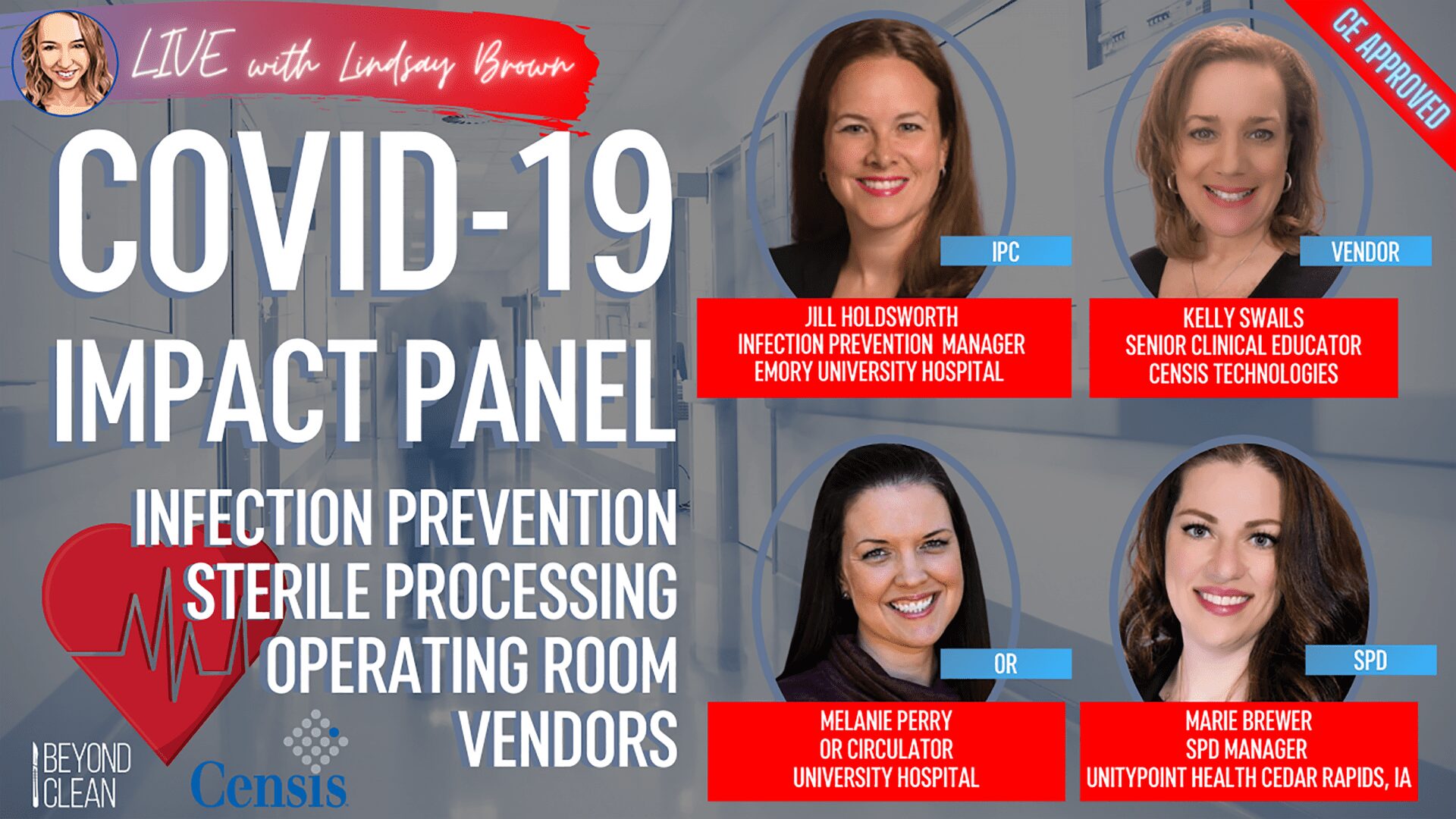Covid-19 has touched us all over the last year. The good news is that everyone in healthcare will benefit from the lessons learned about infection prevention, OR functioning, streamlining sterile processing, creative ways to partner with our clients, and the critical importance of surgical tracking technology.
To identify the ways the pandemic has sharpened our skills in those areas, Censis Technologies sponsored a roundtable discussion on March 10 hosted by Lindsay Brown, on the Beyond Clean Live channels on Facebook, bringing together people in various areas of infection prevention and surgical processing.
Participating in the Roundtable were:
- Kelly Swails, Senior Clinical Educator for Censis
- Jill Holdsworth, Infection Prevention Manager with Emory University Hospital
- Melanie Perry, OR Circulator with University Hospital in Midtown Atlanta
- Marie Brewer, Sterile Processing Division Manager with Unitypoint Health in Cedar Rapids, IA
Overall Impact
Panelists acknowledged that they were not prepared for the massiveness of the impact of COVID on their operations, its emotional toll, and the exhaustion. The pandemic created greater urgency for accelerated care planning while meeting critical needs for personal protective equipment, social distancing, and adapting many interactions quickly to a virtual setting.
Sterile Processing
People involved in sterile processing had to keep doing their normal job and at the same time help with disinfection protocol education on the floors when regular educators were not allowed on-site. There were concerns about being able to turn over equipment fast enough and having the chemicals and equipment to keep all the clinical areas functioning.
Operating Room Flow
Operating room protocols had to change. Many elective surgeries were put off, and when they resumed, OR techs were dealing with a huge backlog, while still working around COVID. Sterile supply processing and equipment shortages became an issue.
OR staff had to learn new ways to get as many cases through ORs as possible by removing surgical block times and sometimes shifting cases to different ORs. Staff had to be very flexible, working with different doctors, protocols, and instrument configurations. The use of surgical instrument tracking technology became even more critical.
Infection Prevention (IP)
IP was huge; ensuring staff managing very sick and contagious patients had all the information they needed to feel confident that their protocols in place would keep them safe.
Clinicians needed the reassurances that they had access to IP around the clock. To meet that need, staff were cross-trained, sometimes moving to other facilities in the system where the need was greater. The IP staff had to learn to collaborate in different ways and make sure N95 protection got to where it was needed. They had to figure out infection control workloads and get education and demonstrations on new cross-functional techniques done differently, especially with clinical educators working from home.
The Changing Role of Vendors
Vendors like Censis that were used to being able to send teams in for needs assessments and training were suddenly told to do everything virtually. Controlling access to clinical settings became of paramount importance.
When they couldn’t be on-site, Censis teams got very good at finding creative ways to do virtual assessments of instrument tracking needs. By working closely with customers and getting their feedback, they could fine-tune the assessments to meet their needs. Virtual training was difficult to do because staff didn’t have time.
Team Dynamics
All the panelists found as they are slowly climbing out of the well of COVID, they have developed some effective means of preventing burnout and support each other. They can now collaborate in different ways, like using Microsoft Teams and other video apps to confer with other team members and vendors.
Going Forward
All the roundtable participants believe that the COVID-19 experience has shown how flexible and resilient clinical staffers are, that they can rise to the challenge and give good care under trying conditions. They are more comfortable coming together to collaborate and brainstorm problems in different ways, both virtually and on-site.
Some Sample Insights
“As IPs in general, we are better prepared and know we are not alone. We know we have to involve different groups early on to effectively handle the workload. There is no time to plan in the middle of a crisis.” – Jill Holdsworth
“COVID has demonstrated how important teamwork is, as well as cross-training and getting out of our silos. It has also made us more appreciative of the work and sacrifices of our staff. Communication and transparency are key. It is important to admit we don’t have all the answers but know how to work together to find them.” – Melanie Perry
“This year was live and learn. We didn’t have an annual conference so we developed webinars to meet the CE needs of our clients. Every hospital we work with has different protocols we’ve learned to follow. When this happens again, we will be able to swivel into pandemic mode almost seamlessly, to continue to meet our clients’ needs.” – Kelly Swails


